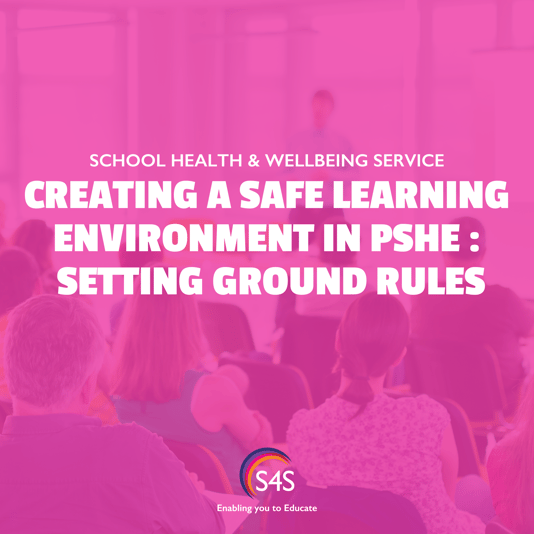Over the course of this academic year, our School Health & Wellbeing Service lead, Russell Stanley, will be sharing his thoughts, tips and advice on key themes across PSHE and wider Personal Development via a series of regular blogs.
This term, we kick-off with a look at some of the basics that we need to have in place to ensure a safe and effective learning environment is created in the PSHE classroom. PSHE is a ‘bit different’ to most other subjects, so we need to make sure we create the right conditions for effective teaching and learning!
Here, Russell takes a look at one of the absolute cornerstones of effective practice in PSHE…ground rules!

Creating a Safe & Effective Learning Environment in PSHE: Setting Ground Rules
A safe and comfortable learning environment is fundamental to effective delivery and learning in the PSHE classroom. Given the broad range of topics covered in PSHE (including RSHE, RSE or whatever else you might call it in your school), some of these can potentially be highly emotive and sensitive for students and teachers alike. In order for everyone to get the most out of PSHE sessions, and maintain a safe and inclusive environment, it is essential to create a classroom climate that clarifies boundaries, maintains respect and enables pupils to openly discuss issues. Teachers and pupils also need to feel confident in challenging any prejudicial views and in dealing with those unplanned ‘off-script’ moments.
The most effective way to foster this kind of environment is by teachers establishing ground rules or agreements in collaboration with their students. These agreements not only promote respect and inclusivity but also help create a structured space where students feel secure enough to express themselves, take risks, and engage and reflect more deeply with the learning and the views and opinions of others.
Understanding the Importance of Ground Rules
Ground rules are clear expectations set at the beginning of lessons or a series of lessons that outline acceptable behaviour and interactions within the classroom. They apply to all participants, including the teacher. As such, they are one of the ‘non-negotiables’ of effective practice in PSHE. However, in my experience of supporting PSHE leads and in observing lessons, they are one of the first things to go out of the window when time is short, or teachers mistakenly think that a particular lesson doesn’t need them!
Whatever you are teaching in PSHE, these sorts of rules serve several critical functions:
· They make expectations of conduct clear for everyone and encourage engagement and participation in learning
· They minimise inappropriate behaviour and comments or discussion and therefore potential disruptions to learning
· They help to protect both students and teachers, encourage fairness and build trust between student and teacher
· They promote respect and inclusivity so everyone feels valued.
As I say, ground rules are essential and should be referred to in all PSHE sessions; from personal experience I know that this is so that when you especially need them, they are already well-established!
Some simple steps to setting effective Ground Rules
These are not exhaustive, but cover the basics of what you will want to achieve:
· Involve pupils: The most effective ground rules are those that students help to create. When students participate in setting boundaries and expectations, they are more likely to understand and adhere to them, so this is imperative. This process can be as simple as a class discussion where students are asked to suggest rules, followed by a vote or consensus to select a few to use.
· Be specific and clear: Vague rules can lead to misunderstandings and inconsistency in adhering to them. Ground rules should be clear, concise, and specific to avoid any ambiguity. For example, instead of saying "Be respectful," a more specific statement could be "Listen without interrupting when someone else is speaking to show respect."
· Stay positive: Using lots of negative, directive rules can come across as too strict and set a less than positive tone. Instead of using “Don’t” or “No”, try using “it’s not ok” instead. For example, instead of “No personal questions” you could try “It’s not ok to ask personal questions of teachers or each other”
· Limit the number of rules: While it's important to cover all the bases, too many rules can be overwhelming and difficult to remember. Focus on the most critical aspects of behaviour, interaction, learning and safety, ideally keeping the list to no more than five or six key rules.
· Revisit, review and remind: Ground rules should not be static and set in stone. As the class dynamics evolves, as topics change, it might be necessary to revisit and revise the rules. If some are not working, change them and add new ones! Regular check-ins with pupils about how the rules are working can help ensure they remain relevant and effective, as well as reminding pupils of the expectations in PSHE.
Implementing and Reinforcing Ground Rules
Once you have set and agreed them, then the work is not over! To ensure that they are embedded and implemented remember these:
· Model the behaviour: Teachers should model the behaviour and attitudes they expect from students. This includes following the ground rules themselves and demonstrating a commitment to reinforce them.
· Positive reinforcement: Acknowledge and reward positive behaviour and adherence to the ground rules. Positive reinforcement will also encourage pupils to continue following them.
· Consistent enforcement: Inconsistent enforcement of ground rules can undermine their effectiveness. It’s important to address any ‘breaches’ of the rules promptly and fairly with all participants. This may take time to begin with, but it’s a worthwhile investment in the long run.
· Create a supportive environment: Use positive language and provide feedback and support when students struggle to meet the expectations. Take the time to explain why a behaviour or action is in breach of your agreed rules so pupils understand and provide positive examples of what you are looking for around any rules that are broken.
Other top tips:
· Make sure that you keep the rules displayed for all to see and refer to them in every session; even a 60 second recap at the start of a session is worthwhile.
· Can all learners understand or read the rules? It can be useful to ask pupils to demonstrate or explain examples of what the rules or behaviour might look like in practice. It can also be helpful to create an image or visual reminder to go with your rules to help pupils remember them; this is also good for pupils who might struggle to read them, so is more inclusive.
· Encourage the inclusion of a rule around confidentiality and age-appropriate safeguarding so pupils know that whilst they might not be able to discuss a very personal matter in class, there are always places for them to go to talk.
· Remember, the rules are for everyone to follow including you!
Whilst you should always try not to overly lead students in selecting certain rules, suggested areas to develop rules around might include:
• Openness
• Confidentiality, in line with your safeguarding policy
• Non-judgemental
• Right to pass and to an opinion
• Not making assumptions or getting ‘personal’
• Listen and share
• Use of correct vocabulary
• Asking questions appropriately (including mitigating against disclosure in class)
Setting ground rules is a powerful strategy for creating a safe, respectful, and productive learning environment for PSHE. They help clarify expectations, promote a positive classroom culture, and empower students to take an active role in their education, as well as building teachers confidence in delivery. They also present an important opportunity for students to develop and reinforce positive social skills such as cooperation, negotiation, reflection and communication, so they provide an excellent learning opportunity in their own right. Invest a little time and effort in them and you will see the benefits!
If you'd like any help or support around the topics discussed in this blog or other parts of PSHE provision in your setting, please get in touch with us for an informal chat!
Meet our Expert -
Russell Stanley
Russell has over 18 years of experience of working in and with schools, both as a primary school teacher, and then in a variety of voluntary, advisory and managerial roles related to PSHE education within both Education and Public Health departments for a Local Authority.
As an independent consultant, Russell now works with schools, charities, local authorities and commercial education businesses across England. He is incredibly passionate about PSHE and the unique difference that this vital subject can make to the lives of children and young people.
